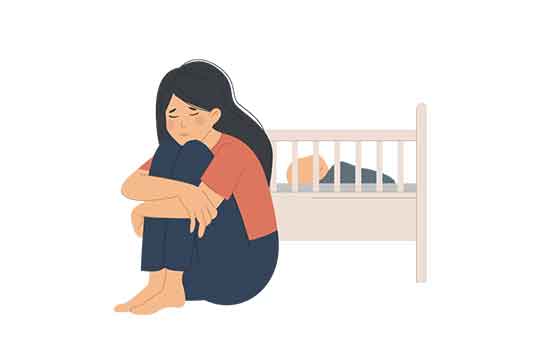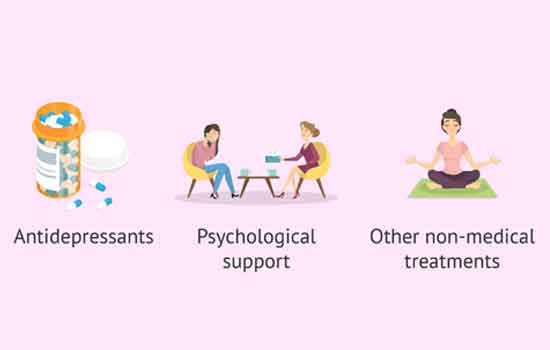Postpartum Blues
Women go through a lot of physical, behavioral, and psychological changes during pregnancy and after childbirth. Two of the most common psychological problems faced by new moms are 1. postpartum blues and 2. postnatal depression. Hence, most of the new mothers go through these problems. It is quite normal to undergo these symptoms. They however often go away within a few weeks after childbirth. Thus, let’s have a detailed look at both postpartum blues and postnatal depression. We will also discuss problems and everything essential related to them.
What is postpartum blues?
Postpartum blues refer to various psychological emotions that women feel after giving birth to a child. These emotions include feelings of sadness, worries, and tiredness. These symptoms usually arise after 2-3 days of childbirth. They may last up to 2 weeks. If you experience symptoms even after 2 weeks, then it is highly recommended to contact a doctor. Some of the most common symptoms of postpartum blues or baby blues include:
- Sorrow
- Cry Cycles
- Mood Swings
- Bad Temper
- Insomnia
- Appetite
- Poor Concentration
- Cloudy Decision-Making
- Overwhelming Feelings
Top tips to get rid of postpartum blues
Here are some of the top tips to get rid of postpartum blues.
- Sleep properly for 8 hours daily.
- Share your feelings with your loved ones and ask for their help.
- Spend some time with yourself by going out once in a while.
- Join a support group of new mothers to feel better and learn more about motherhood.
- Further, avoid alcohol, smoking, drugs, and medicine overuse to prevent symptoms from worsening.
What is postnatal depression?

Postnatal depression is an even worse psychological condition than postpartum blues. The postnatal depression symptoms are far stronger and they may last for a very long time. It is also experienced by new mothers after childbirth due to the physical and psychological changes. The women who experience the signs of postnatal depression should get a checkup. Also, if ignored or left untreated, this depression problem can prove to be life-threatening. In some rare cases, women also tend to experience an extreme emotional disorder called postpartum psychosis.
Signs of postnatal depression
Moving on, here are some of the most commonly experienced signs of postnatal depression are listed below.
- Extreme Mood Swings
- Severe Cry Cycles
- Suicidal Thoughts
- Impatience
- Difficulty In Connecting Emotionally With The Newborn
- Isolating Oneself
- Increased Or Decreased Appetite
- Insomnia Or Oversleep
- Bad Temper
- Guilty Feelings
- Feeling Worthless
- Extreme Anxiety
- Poor Concentration
- Foggy Judgment
- Loss Of Interest In Everything You Like
Postpartum depression test
The postpartum depression test includes a series of different tests conducted by the doctor. Firstly, a suspected patient is asked to fill a depression-screening questionnaire. This is to make sure that the patient is not suffering from baby blues. After that, the doctor may ask questions about psychological symptoms. This includes mood swings, depression, and despair, etc. Also, patients are asked if they feel the same excitement in their favorites chores like before or not.
The doctors will ask if the patients are experiencing various physical and psychological symptoms. The psychological symptoms include
poor concentration,
poor decision-making,
anxiety, guilt feelings,
poor confidence,
self-criticism, and
suicidal thoughts, etc.
The physical symptoms include insomnia, oversleep, tiredness, and the urge to avoid physical activities.
The more severe symptoms a patient is experiencing, the more severe is the depression stage. Hence, if a new mother is experiencing suicidal thoughts or thoughts of harming the newborn. It’s immediately declared as severe postpartum depression. Apart from these questions, doctors may also do some blood tests. This is done to check the hormonal levels and other underlying health problems. In severe cases, new mothers are often hospitalized to get properly treated by psychological medical professionals.
Postnatal depression treatment

Although postpartum depression is a serious problem, yet it is treatable by a medical professional. Further, the treatment duration varies according to the severity of the problem. Also, the recovery speed depends upon the acceptance of the new mother. It also depends on the support provided by loved ones. Thus, patients who state their feelings openly, are able to get rid of this problem sooner. Also, joining group talk-therapy sessions can prove really helpful to eliminate negative thoughts and feelings. Hence, the most important thing about getting postpartum depression treated is being open about feelings and emotions.
Postnatal depression medicine
For postpartum depression, the doctors always suggest the patients take over-the-counter (OTC) antidepressants. Further, these medicines are very effective in balancing the hormones to stabilize the mood and thoughts. Also, the antidepressants are usually helpful in alleviating bad-temper, self-criticism, poor-concentration, and insomnia. Generally, the doctors suggest TCAs (Tricyclic Antidepressants) to breastfeeding women. This is because TCAs don’t affect the newborn’s health by blocking the passage of chemicals into the breast-milk.
However, patients with heart-related disorders or severe depression (suicidal thoughts) are not recommended to take TCAs. Instead, such patients are recommended to take antidepressants. These are called SSRIs (Selective Serotonin Reuptake Inhibitors). Apart from these medicines, talk therapies or talk groups are a good option to get the right treatment.
Also, note here that the patient might be diagnosed with a severe depression disorder called postpartum psychosis. Further, the symptoms might include suicidal ideas, hallucinations, and illogical actions. At last method, for the treatment of postpartum psychosis, tranquilizers might be prescribed by the doctor.
Other psychological therapies for the treatment of postpartum depression include:
- Cognitive Behavioral Therapy (CBT)– to control and manage negative thoughts that cause depression.
- Electroconvulsive Therapy– to treat and manage severe depression cases, in which medicines and CBT doesn’t work.
Most-effective tips to eliminate postpartum depression
Moving on, here are some of the top tips to get rid of postnatal depression symptoms & problems.
- 6-8 hours of sleep daily.
- Eat a healthy and nutrient-dense Postpartum diet.
- Divide your 3 meals into 6-7 smaller ones to regulate blood sugar levels.
- Share your thoughts and feelings with family & friends.
- Also, give yourself time and make to-do lists for everything.
- Join a talk therapy or a talk group of new moms.
- Further, avoid alcohol, smoking, drugs, and medicine overuse to avoid the problems from getting worse.
The Bottom Line!
So, this was everything that you need to know about postpartum blues. This also cleared doubts on postnatal depression symptoms, diagnosis, and treatment. Further, if you experience any of these symptoms, make sure to get immediate medical assistance. Also, make sure to follow the above-mentioned tips to deal with postpartum blues and postnatal depression. Needless to say, always remember that being open and sharing your thoughts/feelings. Hence, this is the key to prevent such kind of psychological problems.



